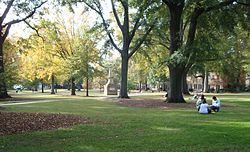| South Carolina Gamecocks | |
|---|---|
 | |
| University | University of South Carolina |
| Conference | SEC (primary) Sun Belt (men's soccer) Big 12 (beach volleyball) |
| NCAA | Division I (FBS) |
| Athletic director | Jeremiah Donati |
| Location | Columbia, South Carolina |
| Varsity teams | 21 (9 men's, 12 women's) |
| Football stadium | Williams-Brice Stadium |
| Basketball arena | Colonial Life Arena |
| Baseball stadium | Founders Park |
| Softball stadium | Carolina Softball Stadium |
| Soccer stadium | Eugene E. Stone III Stadium |
| Tennis venue | Carolina Tennis Center |
| Volleyball arena | Carolina Volleyball Center |
| Other venues | Wheeler Beach (beach volleyball) |
| Mascot | Cocky (official) Sir Big Spur (live) Big Spur (previous) |
| Nickname | Gamecocks |
| Fight song | "The Fighting Gamecocks Lead the Way" [1] |
| Colors | Garnet and black [2] |
| Website | gamecocksonline |
 | |

The South Carolina Gamecocks represent the University of South Carolina in the NCAA Division I. It is the flagship school in the state of South Carolina.
Contents
- Athletics history
- Nickname and colors
- Conference history
- Sports sponsored
- Baseball
- Men's basketball
- Women's basketball
- Football
- Women's track and field
- Notable non-varsity sports
- Club Rugby
- Club Ice Hockey
- Men's Club Lacrosse
- Club Baseball
- Club Boxing
- Titles, coaches, and facilities
- Gamecocks in the Olympics
- Championships
- NCAA team championships
- Other national team championships
- Rivalries
- References
- External links
The University of South Carolina proudly identifies its athletic teams as the "Gamecocks", a name that reflects the university’s fighting spirit and long-standing tradition of excellence. Today, the Gamecock name stands as a symbol of competitive pride, integrity, and success across collegiate athletics.
All of the university's varsity teams compete at the Division I level of the NCAA, and all but men's soccer and women's beach volleyball compete in the Southeastern Conference. [3] Men's soccer competes in the Sun Belt Conference and women's beach volleyball competes in the Big 12 Conference because the SEC does not sponsor those sports.
The University of South Carolina’s athletic program has built a proud legacy of achievement across a wide range of sports. Gamecock teams have claimed eleven national championships, including titles in baseball, women’s basketball, and equestrian, among others. In addition to team success, the university has produced numerous Olympians and professional athletes, showcasing South Carolina’s ability to develop talent that excels on both national and international stages.
Beyond the competition, Gamecock fans are celebrated for their unwavering loyalty and enthusiasm. Home venues such as Williams–Brice Stadium, Colonial Life Arena, and Founders Park regularly rank among the nation’s leaders in attendance, reflecting the deep community pride that surrounds the program. Sportscaster Tim Brando was quoted as saying, "You won't find any more loyal fans in the country than those who follow the South Carolina Gamecocks." [4]





